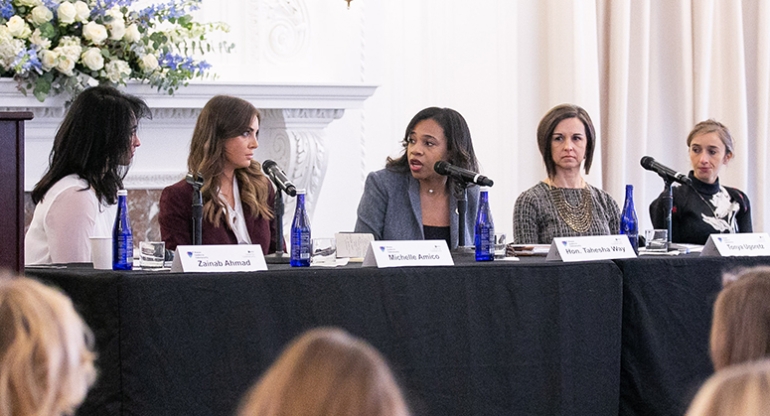Women Leaders in Cybersecurity Conference examines election security
As digital threats continue to multiply, panelists and speakers at the Center for Cybersecurity’s annual Women Leaders in Cybersecurity conference on December 5 discussed emerging trends in cybercrime and enforcement, as well as the rapid growth of the cybersecurity industry itself.
Keynote speaker Niloofar Razi Howe, senior operating partner at Energy Impact Partners, argued that to better counter cybercrime, the cybersecurity industry needs more diversity. “We need people with different perspectives, with different mental models, who are at least as creative as our adversaries—and preferably, actually, more creative than our adversaries,” Howe said. “…We’re solving problems that aren’t just about technology, it’s about building durable businesses, it’s about establishing the right culture, it’s about writing the right policies. It’s about a whole of society response to a problem, to solve the internet for good.”
How to secure elections and other critical infrastruction was the subject of a panel that featured participants from government, law enforcement, and business: New Jersey Secretary of State Tahesha Way; Michelle Amico, cyber security services leader, public sector, at IBM; Valentina Soria, executive director and head of threat intelligence at Morgan Stanley; Tonya Ugoretz, deputy assistant director for cyber readiness, outreach, and intelligence at the Federal Bureau of Investigation; and moderator Zainab Ahmad, a partner at Gibson, Dunn & Crutcher.
Selected quotes from the discussion:
Tonya Ugoretz: “It is also important to look at those state and local elections. We know that there are foreign adversaries who are very active in trying to influence opinion among state and local government officials. … I would say over the past year or so, there’s been a really concerted effort led by some senators on the Senate Intelligence Committee to bring together representatives of different federal agencies and go out to states or bring in representatives to the Capitol and brief them at a classified level on, ‘These are the types of influence efforts that you might be susceptible to or targeted with,’ and try to offer some information on how to recognize those.”
Valentina Soria: “I think there’s still a lot of work to do in this area is understanding the critical interdependence between sectors. I think one of the elements is that we don’t understand enough of how, let’s say, an attack against the energy sector could cascade down to us. At the ground level, yes, we understand that, but in in actual terms, how would that manifest? Then what are the all the different kind of implications that kind of attack could have for financial sector organizations and the like?”
Follow the full discussion on video:
Posted February 27, 2020


